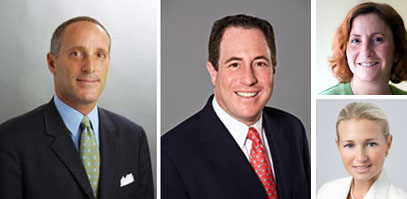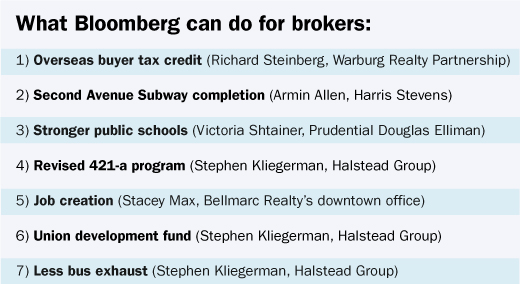
(Clockwise from left) Brokers Richard Steinberg, Steve Kliegerman, Stacey Max, and Victoria Shtainer talk about real estate priorities post-election.
New construction helped define the legacy of Michael Bloomberg’s first two terms as mayor, whether it was parks, schools, apartments, or more controversial mega-projects. That came in lockstep with a wholesale reordering of what should go where in New York, as Bloomberg rezoned 20 percent of the city, which was the most in four decades.
But in Bloomberg’s third term, which he won yesterday in a close election against city Comptroller William Thompson, the city’s real estate community seems focused on different issues — some more far-reaching than others.
Some brokers hope lessons have been learned, like with the Second Avenue Subway, whose famously disruptive construction has hurt sales at the Upper East Side’s Georgica condo, said Richard Steinberg, an executive managing director with Warburg Realty Partnership.
“Any new project near there is being severely compromised,” he said.
Instead, while the domestic buyers take a time out, the city should create a tax credit for first-time overseas buyers, to help soak up surplus apartments, Steinberg said, adding that his Central and South American clients would also benefit if City Hall encouraged banks to issue hard-to-get mortgages to them.
Meanwhile, Stacey Max, the manager of Bellmarc Realty’s Downtown office, hopes Bloomberg can lower the unemployment rate by creating jobs, which is the “best way to get people buying apartments.”
Agreed, said Victoria Shtainer, a senior vice president with Prudential Douglas Elliman, who thinks the mayor could come up with real estate tax incentives to lure businesses back to the city, similar to what was done in the Financial District in the wake of the Sept. 11 attacks.
But a more important goal is to build on the improvements to the public school system, which is the kind of quality-of-life issue that buyers focus on, Shtainer said.
When it was time for her two oldest children to go to school earlier this decade, she chose private schools. But in just the last few years, the public schools have improved so vastly, Shtainer is considering sending her two-and-a-half-year-old to one, she said.
“They help real estate retain its value,” she added.
Cleaning up the air by requiring all buses to run on alternative fuels would also be a smart move, said Stephen Kliegerman, the executive director of development marketing for Halstead.

But the city needs to keep building, which would be a lot more attractive to developers if Bloomberg helped rewrite the 421-a tax incentive program, Kliegerman added.
As it stands now in its post-2008 form, the program is too restrictive, he explained, because it discourages builders who want to build in the city’s most desirable area by placing too many affordable housing demands on them.
Similarly, New York could steal a page from Philadelphia’s playbook and tap union pension money for development, so union workers “are basically creating jobs for themselves,” he said.
And if Bloomberg can’t make these changes happen, Thompson, who lost to Bloomberg by about 50,000 votes, could possibly tackle them; that is, if he were to run again and win, Kliegerman says.
“He would be a good successor,” he said. Spokespeople for Bloomberg and Thompson did not return calls for comment.